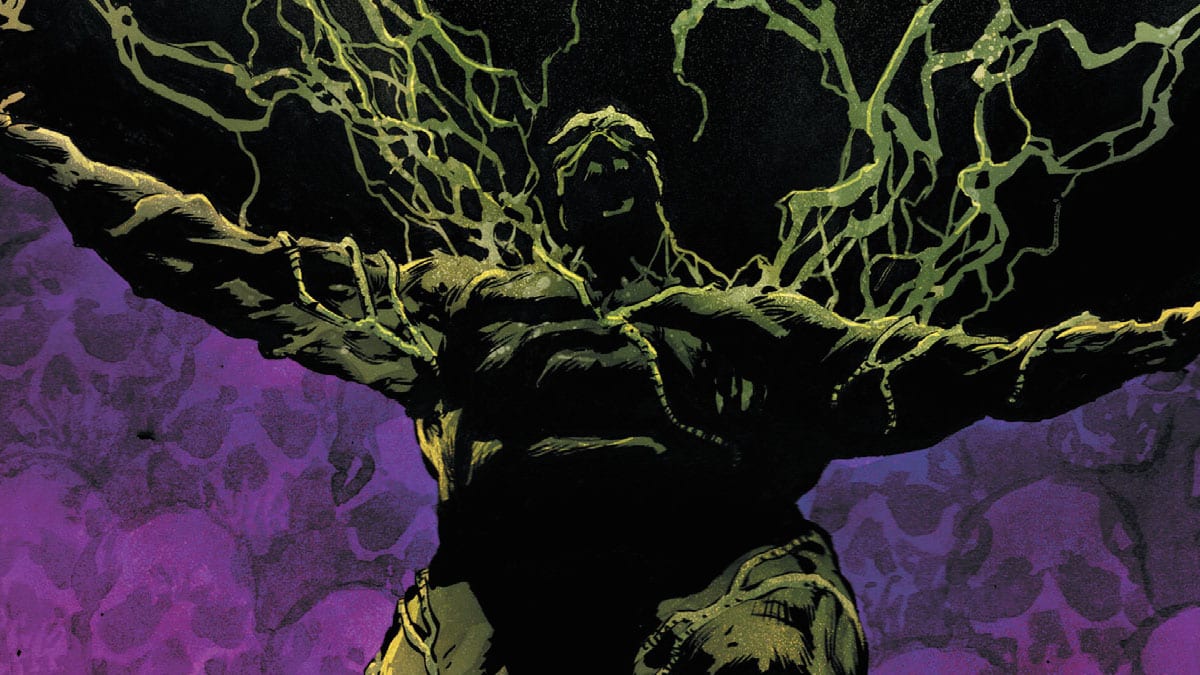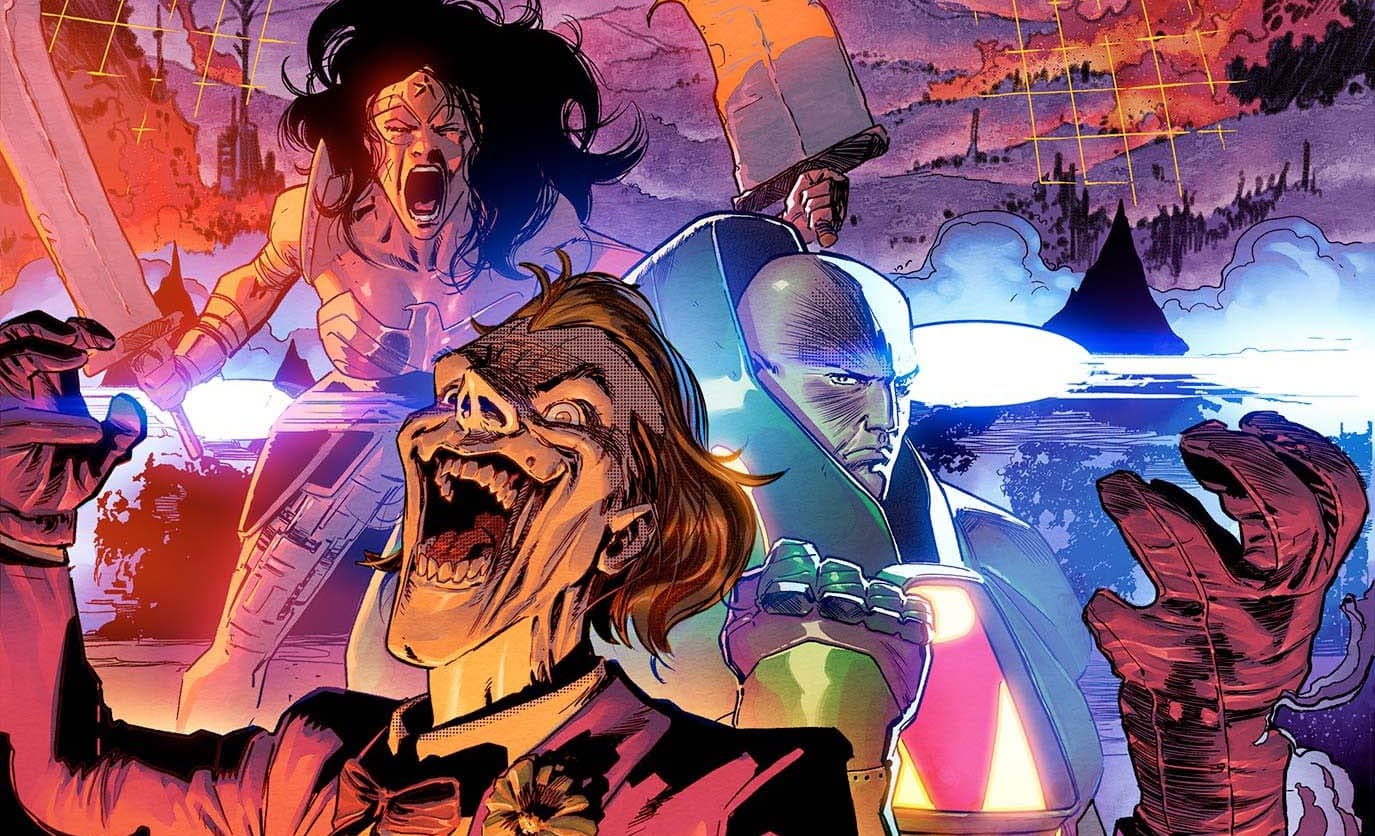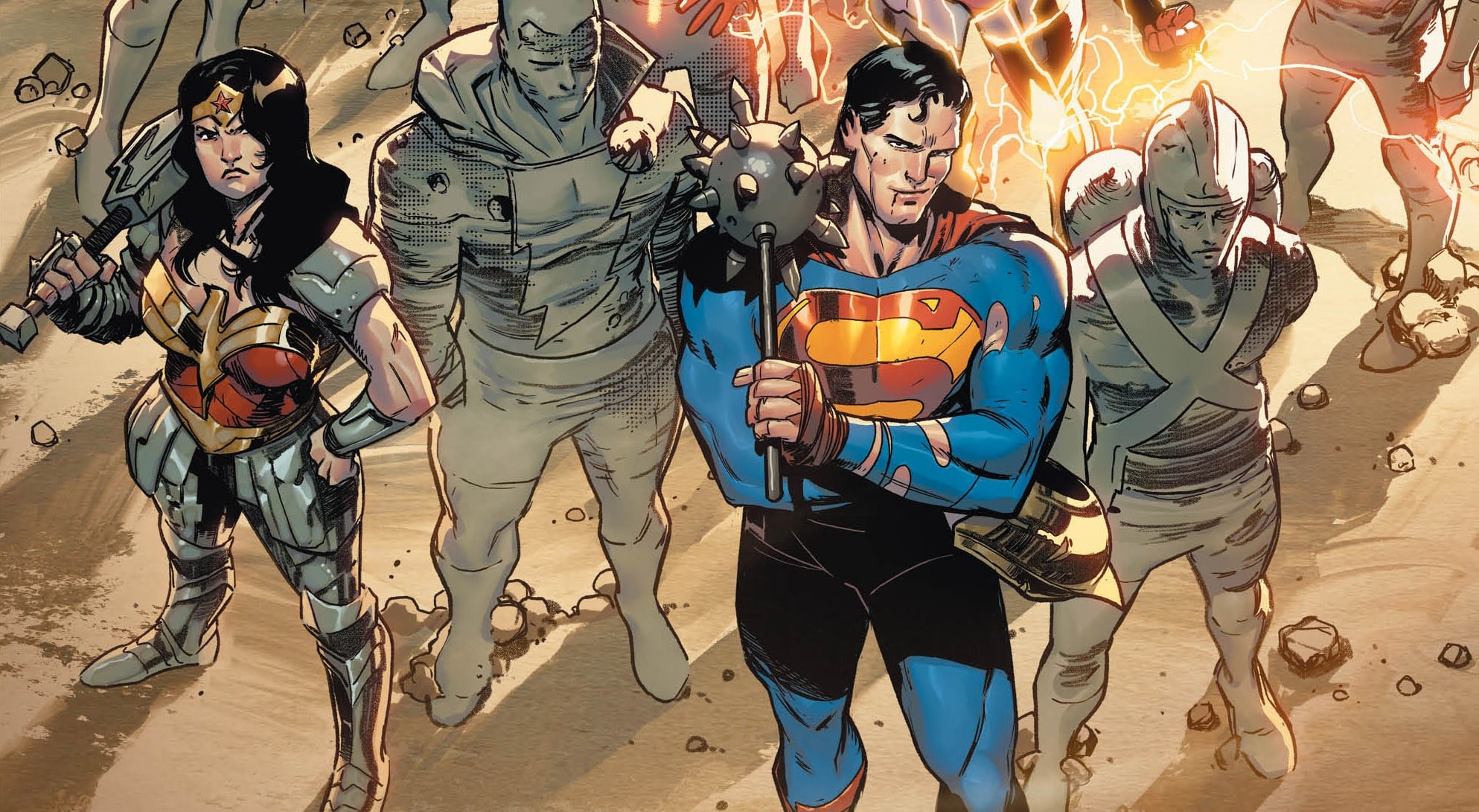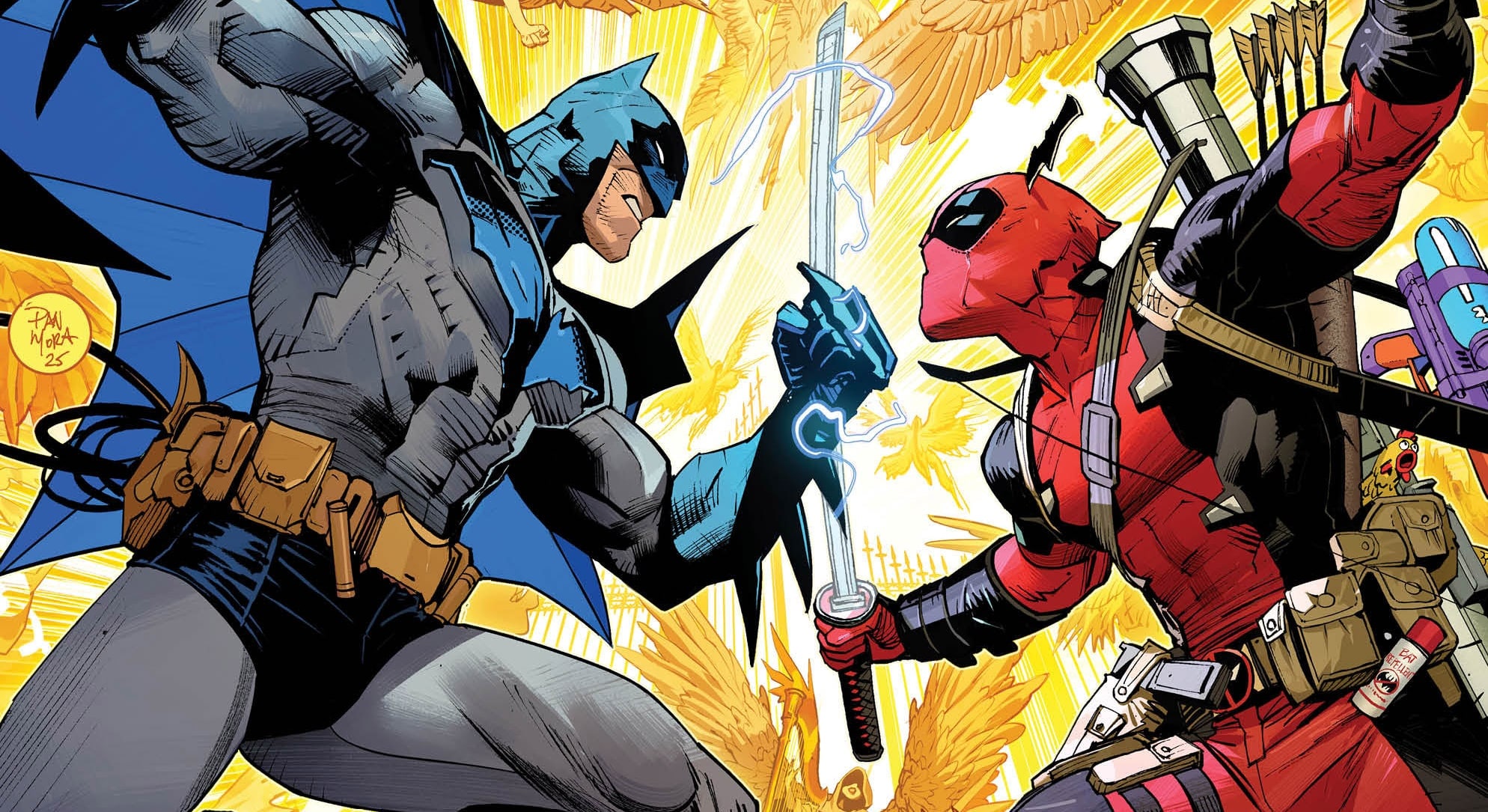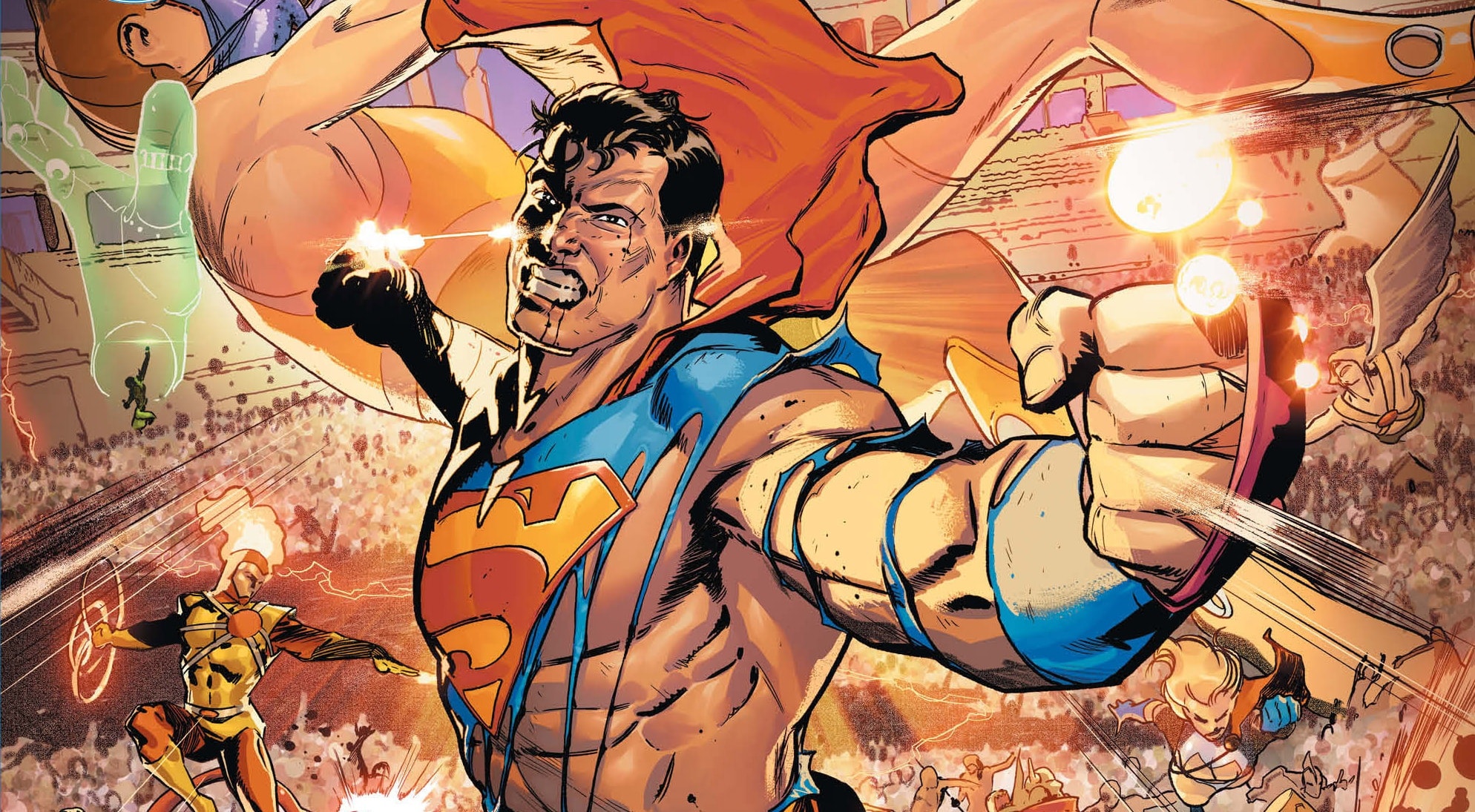Jason Woodrue and Obsidian threaten to plunge the world into eternal darkness and our only hope is…vegetables?! Join us in looking at Future State: Swamp Thing #2, written by Ram V, penciled by Mike Perkins, colored by June Chung and lettered by Aditya Bidikar.
Ari Bard: Hey Vishal… I think plants are our only hope.
Vishal Gullapalli: Oh god uh *hides all the paper I’ve wasted* I’m sure we’ve done a good job convincing them we’re worth saving! Boy it’d suck if humanity treated the environment terribly for the last two centuries. I’m sure that won’t factor into the floral decision one bit.
Confrontation
AB: Yep! Definitely no ongoing resentment or confusion from an offspring of The Green named Indigo, and definitely no ill will from humanity towards the environment found here! In all seriousness though this confrontation between Swamp Thing and Woodrue, similar to how I felt about Indigo last issue, feels almost Shakespearean in some ways. Woodrue speaks with the silver tongue and ramblings of a classic villain who’s never been accepted by The Green he’s sacrificed his humanity for. Nevertheless, his plot is rather strange, and humanity, despite all the hardship they’ve been through, seems rather naive for going along with any of it. What’d you think about this dastardly plot, Vishal?
VG: Honestly, Ari, I feel like this plan never really gripped me. Like, yeah, Woodrue’s doing something evil with Obsidian and trying to take revenge upon the Green, but I never really felt threatened by it. “Plunge the world into eternal darkness” doesn’t really strike me as a huge deal, considering how barren the world already is. I also completely agree about humanity seeming naive for following Woodrue — I think part of the problem was that there was only one issue to both explain the conflict and resolve it. Where the first issue got to really stretch its legs and create its atmosphere, this one was not able to spend long on any specific idea. Something I did really enjoy, though, was Perkins’ depiction of the actual fighting here – the art’s super dynamic and it looks brutal. Anything stick out to you, Ari?
AB: I definitely agree on the fighting aspect Vishal. Perkin’s and Chung do a great job here with some visceral group battle scenes. A lot of times when groups are fighting each other, what we often see on the page looks more like snapshots of a large battle, but the scenes here have more raw kineticism to them. What really sticks out to me, however, is the confrontation this leads up to. It may be a bit blunt, but when it comes to both Swamp Thing and Woodrue, it’s really easy for the pathos surrounding the conflicting sides of nature and humanity to fall flat. Ram V and the rest of the creative team do a great job here of giving their words and expressions weight. On one side we have a plant creature with human memories who has given humanity hundreds of chances and wants them to succeed getting rightfully enraged at their repeated strife, while the other side is a human who has sold everything including his body and soul for the acknowledgement of nature itself. It really feels like their words pour out. How did you feel about this confrontation, Vishal?
VG: I’ve gotta agree. The conflict between Swamp Thing and the Floronic Man has always been one of my favorite archetypes — the chosen one vs. the one cast away. The man with all the ambition vs. the man — er, plant — with all the success. And Ram V does a fantastic job bringing the pathos of this conflict to the forefront. Woodrue’s dialogue reads, as you mentioned, Shakespearean. He has sacrificed everything he is, everything he has, in a desperate bid to have what Swamp Thing was freely given. And still, he was rejected. It’s such a painful conflict for him, and has inspired such cruelty.
Sacrifice
VG: I’m a sucker for cruelty in villains, especially the kind of cruelty that comes from a specific relationship with someone rather than just generally being evil. And Woodrue has that in spades here, as he forces Swamp Thing to sacrifice what he holds dear in order to save what he tries to pretend he does not. And in this sacrifice, we learn the nature of Swamp Thing’s creations, of what resides inside them. Ari, what’d you think of this revelation?
AB: I am very conflicted about the conclusions that are made and the implications of these sacrifices. The creative team masterfully builds up to this climax via the Da Vinci-esque sketch pages over the course of these two issues. We get to learn the details of how these creations were built, the thought process behind every inch of their anatomy and to question the very existence of what he’s created and reach the catharsis he does feels extremely disappointing in a lot of ways. The very idea that the human soul is different, special and vastly superior and necessary is a conclusion that greatly angers me and is contradictory to many faiths, belief systems, and philosophical creeds. The idea that only humanity has this potential for “being more,” which is essentially just adaptation and evolution, is absurd. There is an inherently superior view of humanity that irritates me to no end. Even when it comes to Swamp Thing’s creations, the idea that innocence, doubt and ambition are in any way basic or singular states of being is rather overstating things. There are infinite complexities to the nature of something like ambition, so dismissing it as something static just feels so wrong.
That being said, Ram V and the rest of this creative team have earned my faith in their storytelling, and I have a bit of a theory as to what could be going on here. Normally I don’t like to speculate, but this could very well be meant as a final tale for Alec Holland, and if that is the case, I think it’s important to discuss what my frustration of the above could mean in that context. While I mentioned that there are many belief systems that believe all living creatures were given souls, many sects of Judeo-Christian religions do not believe as such. They do believe that the human soul is unique, and while I am no expert on this subject like some of our esteemed colleagues at ComicsXF, I think that it’s safe to say that Alec Holland has routinely been written with roots in religious symbolism and imagery. Perhaps this rather narrow frame of reference I discuss above comes from the mind of Alec Holland, and not The Green. I may be overreaching here, but if that is the case, then this final story is given a new and important context. It’s only then that we can see all that Alec Holland as the avatar of The Green was able to give and all that he never had, but we can also see all of his limitations and shortcomings. If I’m right and this two-issue story hints at a new foundational frame of reference for Swamp Thing in Levi Kamei, then it does a brilliant job at saying goodbye while hinting at what is to come. Vishal, I know this is a lot, but can you make sense of this ramble?
VG: I totally see where you’re coming from, I do! But let me provide an alternate take. In my personal life, I work in software — computers are a big part of how I view the world, and especially how I view creation. And what I saw in this issue was the idea of creation as viewed through that lens. Swamp Thing’s children, his offspring — they’re not truly children. They’re not autonomous entities. They are just aspects of Swamp Thing (and presumably Alec) himself. Much like how we consider that AI, that machines we build, don’t have imaginations or free will, Swamp Thing seems to see his own creations that way — purely as extensions of his own self, rather than individuals.
I think that’s corroborated by the fact that they’re the personifications of his own emotions. Indigo never truly had free will — he was always bound to disagree with Swamp Thing, to hold every decision he made in contempt. I don’t think the idea of this revelation was a specific lauding of humanity in particular — I think it was trying to say that a society that consists of one person is ultimately not a society at all. The collection of individuals that is humanity would always have a brighter future than the collective that is just Swamp Thing.
AB: I agree that this is what Swamp Thing may have had in mind when he created them and maybe that’s how he viewed them until the end, but do you really believe that all they proved to be on the page were emotional personifications? Perhaps they really were not autonomous and that’s why they never left Swamp Thing no matter now they felt about him, Indigo especially. But maybe, despite not understanding or feeling hurt by Swamp Thing, they still revered him as their creator. If we ever create computers that pass a complex Turing Test and demonstrate human levels of artificial intelligence, or even if we go beyond that, will we still treat those creations as “less than” and claim they don’t have a soul? I don’t think that would be right. Perhaps I am giving them more than what’s on the page. Perhaps I received who they were as more than what’s on the page. Your conclusion about the collective humanity being greater than just Swamp Thing himself is a good one, but just as Pinocchio grew to be much more than the creation Gepetto designed him to be, it’s hard for me to reduce those creations down to just offshoots.
VG: I totally get where you’re coming from! I think the problem is ultimately the fact that this is just two issues — I don’t think we ever really got enough content in the book for me to be certain one way or another. I honestly do prefer your take, but it makes me wish we got at least another issue to explore that. The concept of Swamp Thing sacrificing that which he does not understand to save that which does not understand him is horribly tragic in ways that would work really well in the story.
Ultimately, I agree that this feels like it’s the Last Alec Holland Story. I think that both the sacrifice he makes and the way he looks at humanity are through a specific lens that’s proven to be outdated by the ending to this issue. I’m really excited to see the new Swamp Thing that we’ve been promised in solicits to the new #1 next month.
Rebirth
VG: But in this final story of Alec Holland, we of course have to talk about the final action of Alec Holland. When his back’s against the wall, when he needs to choose between the humanity that has constantly hurt him and the vegetation he has promised to nurture, Alec chooses mankind. And as you’ve gone into, this isn’t really a good choice. How do you feel about the actual ending, the loss of Swamp Thing’s offspring aside?
AB: I enjoyed it despite it, too, feeling a little rushed. Nevertheless, while Perkins and Chung really shine in the horror and uncanny elements of the book, one shouldn’t understate the beauty that they brought to this ending. There were a few panels where the ink was a little heavy, but I thought the ending overall was beautiful and poetic. Despite what I said earlier, I do think that humanity’s capacity to both hope and grow is one of its greatest strengths, and so I hope their continued survival is indicative of that. That being said, simply surviving, falling in love and building a home isn’t enough. Even expressing a newfound deep gratitude for the nature that gave them their survival isn’t necessarily enough. Do you think humanity actually proved that it could be better in those final pages, Vishal, or is a dream what it will always be?
VG: The book clearly frames it in a hopeful, positive light, and the idealist in me wants to agree. In order for Swamp Thing’s sacrifice to feel at all worth it, humanity has to be better. But I don’t know. Strife will return. Conflict will return. The only thing we can do is try to keep it from taking over and destroying what we have. But that’s really the eternal conflict of superheroics, isn’t it? The hope that one day there will no longer be a need for heroes — that one day, the dream will be real.

